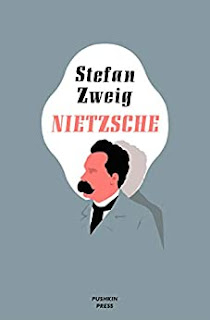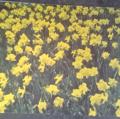Stephanie Jane recenzis Nietzsche de Stefan Zweig
An extended rapturous essay!
4 steloj
I think it's a safe bet to say that Stefan Zweig was quite the fan of Nietzsche! This novella-length work is less a biography in the accepted sense, although I did get to find out some of the facts of Nietzsche's life, and more an extended rapturous essay which frequently tips over into giddy fanboying. I hadn't got that idea of Zweig as an author from the previous book of his I read, a traditionally styled biography of Marie Antoinette, so I was entertained by it this time around. Zweig does have a flowery turn of phrase and loves showing off his vocabulary - 'dithyramb', anyone? I had to look it up! - and I loved the contrast of this obviously learned scholar being so effusive. Admittedly, it works better in this shorter format. I was starting to feel that the book had outstayed its welcome shortly before I came …
I think it's a safe bet to say that Stefan Zweig was quite the fan of Nietzsche! This novella-length work is less a biography in the accepted sense, although I did get to find out some of the facts of Nietzsche's life, and more an extended rapturous essay which frequently tips over into giddy fanboying. I hadn't got that idea of Zweig as an author from the previous book of his I read, a traditionally styled biography of Marie Antoinette, so I was entertained by it this time around. Zweig does have a flowery turn of phrase and loves showing off his vocabulary - 'dithyramb', anyone? I had to look it up! - and I loved the contrast of this obviously learned scholar being so effusive. Admittedly, it works better in this shorter format. I was starting to feel that the book had outstayed its welcome shortly before I came to the end.
Zweig focuses on Nietzsche in the incarnation of a tortured artist, rather than as a philosopher. He demonstrates how the great thinker differed from his contemporaries and predecessors within the German philosophy field - being bitchily dismissive of several famous names. I finished reading feeling that I hadn't really gained any particular insights into what Nietzsche thought, but I had a far greater understanding of how he did so and the physical malaises which drove him. I could also empathise with his minimalist peripatetic existence. I'm delighted to have discovered this unusual biography and hope Pushkin have published others in the series in equally as accessible English translations.

